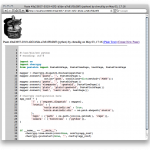Posted: May 14th, 2010 | Author: chmullig | Filed under: Nerdery | Tags: pmxbot, python | No Comments »
As everyone is well aware, lunch is the most important part of the work day. However it’s often hard to find inspiration when deciding on a delectable dining destination. The ideal solution is to have someone propose options, and everyone reject them until consensus is reached. However nobody enjoys that. Computers can propose options, but that’s less social.
pmxbot has an existing !lunch command that’s supposed to help. Unfortunately you have to fill out the dining list yourself, and frankly, that’s a pain. The result is lots of old, bad definitions in a few limited areas. It does let you sneak in some comedy options (What to have in Canton? PB&J? Leftovers?), but for the main purpose it kinda sucks.
The solution is to use someone else’s database. I cooked one up yesterday pretty quickly using Yahoo Local’s API and the pYsearch convenience module. The result is quite easy, really. The only wrinkle is you need that module (someone could rewrite it to use just urllib and simplejson, if they cared) and a Yahoo API key.
The code is below, also available at http://libpa.st/2K0kh.
@command("lunch", doc="Find a random neary restaurant for lunch using Yahoo Local. Defaults to 1 mile radius, but append Xmi to the end to change the radius.")
def lunch(client, event, channel, nick, rest):
from yahoo.search.local import LocalSearch
location = rest.strip()
if location.endswith('mi'):
radius, location = ''.join(reversed(location)).split(' ', 1)
location = ''.join(reversed(location))
radius = ''.join(reversed(radius))
radius = float(radius.replace('mi', ''))
else:
radius = 1
srch = LocalSearch(app_id=yahooid, category=96926236, results=20, query="lunch", location=location, radius=radius)
res = srch.parse_results()
max = res.totalResultsAvailable if res.totalResultsAvailable < 250 else 250
num = random.randint(1, max) - 1
if num < 19:
choice = res.results[num]
else:
srch = LocalSearch(app_id=yahooid, category=96926236, results=20, query="lunch", location=location, start=num)
res = srch.parse_results()
choice = res.results[0]
return '%s @ %s - %s' % (choice['Title'], choice['Address'], choice['Url']) |
Posted: May 3rd, 2010 | Author: chmullig | Filed under: Nerdery | Tags: library paste, paste, pmxbot, python | No Comments »
The ever impressive Jamie wrote a nice little paste bin at work a while back. It was dead simple to use, relatively private (in that it used UUIDs and didn’t have an index), and hooked into pmxbot. Unfortunately like most of the code written internally it used a proprietary web framework that’s not open source. It’s like cherrypy & cheetah, but different.
I decided to modify jamwt’s pastebin to make it open sourceable. It’s now up on BitBucket as Library Paste. It uses cherrypy with Routes (NB: Must use routes <1.12 due to #1010), mako for templating, simplejson plus flat files for a database, and pygments for syntax highlighting. One of the great features is that it also allows one click sharing of files, particularly images. How handy is that?
For code – you specify a Pygments lexer to use and it will highlight it with that when displayed. You can leave it unhighlighted, and always get the plain text original.
For files – it will take anything. It will read the mime type when you upload it, and set it on output. It will tell your browser to display it inline, but it will also set the filename correctly so if you save it you’ll get whatever it was uploaded with, rather than the ugly uuid with no file extension.
There are a few minor improvements from the in house original. First, the upload file is on the same page rather than separated from uploading code. Second, it handles file names with spaces better. Third, there is no third.
I’d really like to get configuration/deployment setup. What’s considered a good, flexible way to to make it easy for folks to deploy an app like this? Use cherrypy config files, build a little bin script and optionally let folks run it behind wsgi if they want to nginx/apache it?
I’d also like to try with putting it up on Google App Engine. Looks like you have to jump through a few hoops to adjust code to use it, and I’d have to adapt the flat file system to use their DB.
One nifty “hidden” feature it has is that you can ask it for the last UUID posting for a given user, if they filled in the nickname. You simple visit http://host/last/user and get back a plain text response with the UUID. pmxbot can use this to provide a link to someone’s most recent paste. Here’s the generic pmxbot function we used.
@command("paste", aliases=(), doc="Drop a link to your latest paste on paste")
def paste(client, event, channel, nick, rest):
post_id = urllib.urlopen("http://paste./last/%s" % nick).read()
if post_id:
return 'http://paste/%s' % post_id
else:
return "hmm.. I didn't find a recent paste of yours, %s. Try http://paste to add one." % nick |
-

-
The input/home screen for adding a new paste. Earlier users note – file input on the same page.
-

-
Showing some syntax highlighted code (indeed, Library Paste itself. The pastebin equivalent of boostrapping?)
-

-
An image being served up by library paste. It automatically sets the mime type and filename based on what was uploaded.
Update:
I’ve since made a google app engine compatible version. It’s publicly hosted and you’re welcome to use it. http://librarypastebin.appspot.com and at http://libpa.st. Yes, I bought a stupid short URL for it!
No Comments »
Posted: April 7th, 2010 | Author: chmullig | Filed under: Nerdery | Tags: irc, pmxbot, python | 3 Comments »
My employer just open sourced a fork of the IRC bot we’ve been using internally for years, pmxbot. jamwt and some others are responsible for all the good parts of it, but I’ve been responsible for most of the feature bloat for the past few years. The open source version strips out internal code that or didn’t need to be shared, and overall makes it much more flexible for others to use.
It’s really a pretty great system, and I’m going to share some of the actions that we didn’t release, but that you might get some value or inspiration from. Of note, a few of these will reference internal libraries, so you’ll need to switch ’em to use urllib2 or similar.
The basic way you extend pmxbot is with two decorators. The first is @command, and the second is @contains. @commands are commands you explicitly call with “!command” at the beginning of a line. @contains is a very simple pattern match – if the phrase you register is in the line (literally “name in lc_msg”).
When you use the decorators on a function you’re adding it to pmxbot’s handler_registry. Every line of chat it sees will then be checked to see if an appropriate action exists in the registry, and if so the function is called. It goes through the registry in a certain order – first commands, then aliases, then contains. Within each group it also sorts by descending length order – so if you have two contains – “rama lama ding dong” and “ram” – if a line had “rama lama ding dong” it would execute that one. pmxbot will execute exactly 0 or 1 actions for any line.
The decorators are fairly simple – @command(“google”, aliases=(‘g’,), doc=”Look a phrase up on google, new method”). First is the name of the command “google”, which you trigger by entering “!google.” Second is an optional iterator of aliases, in this case only one, “!g.” You could have several in here, such as aliases=(‘shiv’, ‘stab’, ‘shank’,). Last is an optional help/documentation string that will be displayed when someone does “!help google”. The contains decorator is the same, but uses @contains and doesn’t support aliases.
A command is called when it’s picked out of the handler registry to handle the action. Any handler will be called with the arguments – client, event, channel, nick and rest. You can ignore client and event for 99% of cases, they’re passed through from the underlying irc library. Channel is a string containing the channel the command was made in. Nick is the nickname of the person who made the call. Rest is the rest of the message, after the command prefix is removed if it’s a command. For example if we saw the following line in #pmxbot: “<chmullig> !g wikipedia irc bots” the google function would be called with channel == “#pmxbot”, nick == “chmullig” and rest == “wikipedia irc bots”.
A basic command
Putting it all together, let’s look at a basic command – !google.
@command("google", aliases=('g',), doc="Look a phrase up on google")
def google(client, event, channel, nick, rest):
BASE_URL = 'http://ajax.googleapis.com/ajax/services/search/web?v=1.0&'
url = BASE_URL + urllib.urlencode({'q' : rest.strip()})
raw_res = urllib.urlopen(url).read()
results = json.loads(raw_res)
hit1 = results['responseData']['results'][0]
return ' - '.join((urllib.unquote(hit1['url']), hit1['titleNoFormatting'])) |
It registers the function google, under the command google, with an alias g. Note that the google function doesn’t have to match the name in the decorator, it can be anything. Within this function we can do anything you could want to do in python – we use urllib to call google’s ajax apis, and use simplejson to parse it and return the URL and title of the first hit. Anything returned or yielded from the function is passed back to the channel it was called from. If you want to have pmxbot perform an action, just return text that begins with “/me.”
Now let’s do a short contains example – simple enough.
@contains("sqlonrails")
def yay_sor(client, event, channel, nick, rest):
karmaChange(botbase.logger.db, 'sql on rails', 1)
return "Only 76,417 lines..." |
This one has no doc (you can’t get help on contains ATM) and it’s pretty simple. That karmaChange line increases the karma of “sql on rails,” but we’re not talking about karma.
Yahoo
You’ll need the BOSS library for this, and you’ll need to register an API key and put a config file where the library expects it. However it works fine once you do all that.
@command("yahoo", aliases=('y',), doc="Look a phrase up on Yahoo!")
def yahoo(client, event, channel, nick, rest):
from yos.boss import ysearch
searchres = ysearch.search(rest.strip(), count=1)
hit1 = searchres['ysearchresponse']['resultset_web'][0]
return hit1['url'] |
Trac
This is one of my favorites. We use Trac internally for ticketing. We have two commands that use the XMLRPC plugin for Trac to make it accessible for pmxbot. The first finds any possible ticket number (eg #12345) and provides a link & ticket summary. Note that we put a hack into the handler registry to make this the first contains command it checks, you could do something similar if you wanted to modify it.
@contains('#', doc='Prints the ticket URL when you use #1234')
def ticket_link(client, event, channel, nick, rest):
res = []
matches = re.finditer(r'#(?P<ticket>\d{4,5})\b', rest)
if matches:
tracrpc = xmlrpclib.Server('https://user:pass@trac/xmlrpc')
for match in matches:
ticket = match.groupdict().get('ticket', None)
if ticket:
res.append('https://trac/ticket/%s' % ticket)
try:
res.append(tracrpc.ticket.get(int(ticket))[3]['summary'])
except:
pass
if res:
return ' '.join(res) |
The second uses the RPC to search trac for a ticket or wikipage that might be relevant.
@command("tsearch", aliases=('tracsearch',), doc="Search trac for something")
def tsearch(client, event, channel, nick, rest):
rest = rest.strip()
url = 'https://trac/search?' + urllib.urlencode({'q' : rest})
tracrpc = xmlrpclib.Server('https://user:pass@trac/xmlrpc')
searchres = tracrpc.search.performSearch(rest)
return '%s |Results: %s' % (url, ' | '.join(['%s %s' % (x[0], plaintext(x[1])) for x in searchres[:2]])) |
Notify
This one is a total hack, but we were having issues with coordinating a certain team. We added a !notify command to help folks easily let everyone, online & off, know what they were up to. It simple sent an email to a distribution list.
@command("notify", doc="Send an email to list@domain.com, let them know you accidentally wiped a server.")
def notify(client, event, channel, nick, rest):
server = smtplib.SMTP('mail.domain.com')
notification = '%s: %s' % (nick, rest.strip())
try:
sigraw = rand_bot(client, event, '!notify', nick, rest)
if type(sigraw) == GeneratorType:
sigraw = '\r\n'.join(sigraw)
signature = '\r\n\r\n--\r\n%s' % sigraw
except:
signature = ''
msg = 'From: pmxbot@domain.com \r\n'\
'Reply-To: list@domain.com \r\n'\
'To: list@domain.com \r\n'\
'Subject: !notify: %s \r\n\r\n'\
'%s \r\n\r\n'\
'Hugs & Kisses,\r\npmxbot'\
'%s\r\n\r\n' % (notification, notification, signature)
server.sendmail('pmxbot@domain.com', ['list@domain.com',], msg)
server.quit() |
Invite
This one is a little weird, but as more people got on IRC we wanted to send them a little email to let them know how to access it, etc. It’s also useful to harass people who aren’t online, but should be.
@command("invite", aliases=('spam',), doc="Send an email to an invitee, asking them to join irc.")
def invite(client, event, channel, nick, rest):
server = smtplib.SMTP('mail.domain.com')
if rest:
try:
inviteText = rest.split(' ', 1)[1]
except:
inviteText = ''
invitee = rest.split(' ', 1)[0] + '@domain.com'
try:
sigraw = rand_bot(client, event, '!notify', nick, rest)
if type(sigraw) == GeneratorType:
sigraw = '\r\n'.join(sigraw)
signature = '\r\n\r\n--\r\n%s' % sigraw
except:
signature = ''
msg = 'From: pmxbot@domain.com \r\n'\
'Reply-To: noreply@domain.com \r\n'\
'To: %s \r\n'\
'Subject: join us in irc! \r\n\r\n'\
'%s \r\nRemember, you can find about irc here: https://intranet/IRC\r\n'\
'You can access IRC via your web browser at https://domain.com/irc \r\n\r\n'\
'Hugs & Kisses,\r\n%s & pmxbot'\
'%s\r\n\r\n' % (invitee, inviteText, nick, signature)
server.sendmail('pmxbot@domain.com', [invitee,], msg)
server.quit() |
Personal Responses
We have a ton of these, this is just one example. They watch for people being referenced, and occasionally (the randomness is key for many of them, to keep from being obnoxious) respond.
@contains("elarson")
def elarsonthemachine(client, event, channel, nick, rest):
if nick == 'elarson' and 'http://' not in rest and 'https://' not in rest:
return 'elarson - The Machine!!!' |
Other RPCs
I won’t show you the code, because removing the specific stuff would make it boring. But we have about a half dozen internal RPCs we can call with it. Some use Pyro, others XMLRPC. That trac search example is pretty representative.
RSS/Atom
We have pmxbot monitoring about a half dozen RSS feeds. The intranet and dev site both have them, we monitor twitter search for a bunch of keywords, as well as google news. It’s a pretty sweet feature, if you ask me.
In conclusion, pmxbot is awesome. I’d like to make it even easier for people to add their own features. Maybe include a setting in the YAML conf file that’s a python file which is imported? What else do you have (all zero of you using pmxbot)?
3 Comments »


